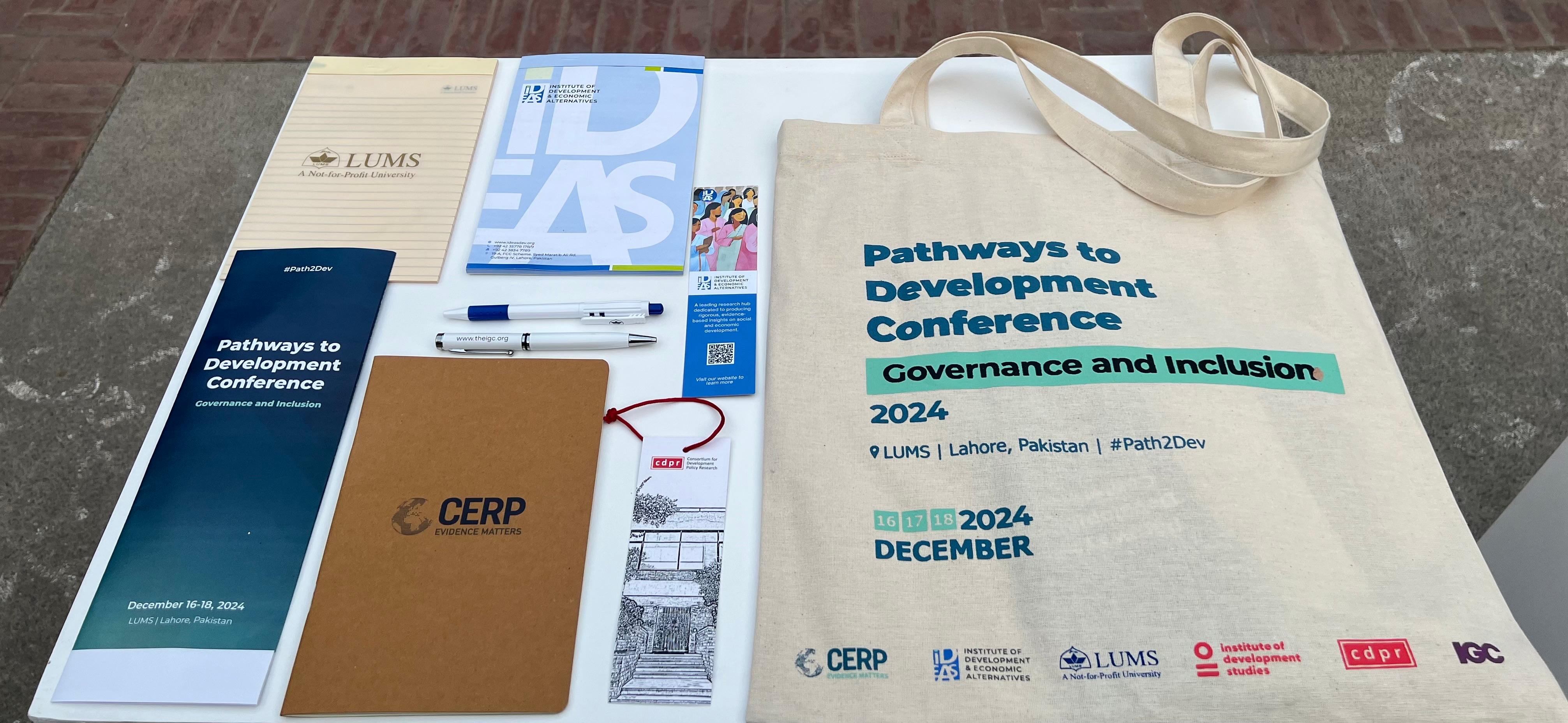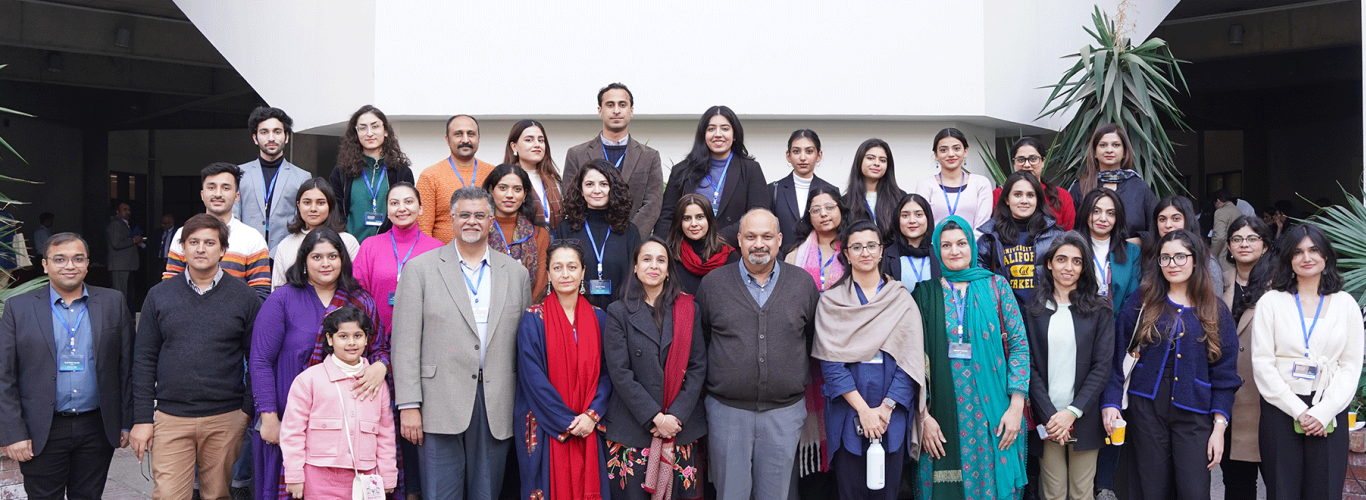5 Minutes with the Organisers of the Pathways to Development Conference 2024
We caught up with some of the team members behind the Pathways to Development conference to talk about their favourite moments, the challenges of pulling off a seamless event, and why they think this conference stands out. Here’s what Momina Idrees (MHRC), Rida Fatima (MHRC), Emun Hafeez (CDPR), Saman Tariq (CERP), Dr. Hadia Majid (LUMS), Dr. Farah Said (LUMS), Lutufullah Khan (IDEAS), and Alishbah Khwaja (IGC) had to say:
Q: Organising a conference of this scale sounds daunting! What was the biggest challenge?
Momina: Honestly, making it look ‘effortless’ took the most effort! Getting all the centres and teams to work as one cohesive unit wasn’t easy. We had structured meetings every week, and duties were divided based on everyone’s strengths. That proactive approach became our biggest asset.
Rida: For me, the challenge was ensuring coordination across multiple departments. There’s so much that can go wrong—availability of speakers, travel logistics, and on-the-day hiccups. But we stuck to a system of regular check-ins and clear feedback loops, which kept things on track.
Saman: Pathways to Development brings together some of the world’s leading researchers and policy practitioners. The biggest challenge lies in accommodating schedule changes to ensure the availability of all panelists, speakers, and presenters.
Q: What made you feel like the conference was a success?
Momina: Seeing the packed auditoriums—even for paper sessions! Usually, you expect full attendance for the keynotes, but this year, even the smaller sessions were buzzing with energy. And the diversity in the audience—students, policymakers, researchers—was incredible.
Rida: For me, it was hearing the depth of the questions from the audience. It showed that the discussions resonated with people across disciplines and backgrounds. Also, watching the media capture these moments made it feel like the impact would go far beyond the event itself.
Emun: The great turnout at the sessions!
Saman: Seeing attendees actively engaged in discussions and networking and receiving positive feedback. Every passing year, the conference keeps getting bigger. We had the largest turnout this year!
Lutufullah: I believe this conference was a huge success as it brought together practitioners from diverse backgrounds, including both the private and public sectors, ranging from those with 5 years of experience to those with 40 years. They did not just answer questions with words but also shared results, findings, and real-world examples of what has worked in the past and what is working now.
Q: Tell us about a standout moment?
Momina: Danish Mustafa’s session on urban design was unforgettable. He challenged us to think about cities from a masculine and feminine lens—how infrastructure favours certain experiences while sidelining others. His delivery was just as riveting as the content itself.
Dr. Farah: For me, it’s always the interdisciplinary panels. This year, we had a behavioural economist, a political scientist, and a geographer all answering the same question in completely different ways. The richness of those insights is what makes Pathways unique.
Emun: The first plenary session was brilliant. It was great to hear the positive feedback from people who have become regular attendees of the conference.
Saman: As part of the communications team, it was incredible to see teams from different organisations come together seamlessly for a shared vision. Watching all the pieces fall into place was truly inspiring and rewarding.
Alishbah: The excitement on the faces of attendees and the appreciation from everyone. It was a badge of honour!
Q: This year’s theme was Governance and Inclusion. How did that shape the event?
Dr. Hadia: Inclusion wasn’t just a theme; it was something we practised. About 45% of our participants were women, and we had several all-women panels. We actively try and make sure there are gender equality groups. I think that's really important for all of us as organisers. Our core committee is pretty much all women as well - which is fantastic!
Saman: This year’s theme set the stage for an interdisciplinary exploration of how policies, institutions, and reforms can bridge economic, social, and political divides. By focusing on diverse areas such as democratic governance, institutional reforms, service delivery, and inclusion in public health, education, and climate change, the conference brought together varied perspectives and open pathways for discussion.
Momina: We also made an effort to include policymakers and practitioners alongside academics. It’s not just about presenting research—it’s about connecting ideas to action.
Q: What’s one thing you want attendees to take away from this year’s conference?
Rida: I hope they left with an appreciation for how interdisciplinary research can tackle real-world problems. And I hope they come back next year!
Momina: I want them to come back next year! But also, I hope they took away a sense of community. Academia can feel isolating, but this conference is proof that collaboration—across disciplines and sectors—can create something truly impactful.
Emun: That academic research is the groundwork for policy change - and that everyone’s contribution counts.
Saman: I want attendees to take away the importance of engaging in meaningful discussions and the value of evidence-based work in addressing complex development challenges, encouraging attendees to explore how differing opinions can lead to innovative and impactful solutions.
Lutufullah: That meaningful progress is a slow process, and rapid development often misses important nuances. I believe that real beauty lies in curiosity- asking questions, exploring ideas, and not rushing to conclusions.

Q: Lastly, a fun one: What was your favourite item in the conference tote bag?
Rida: Definitely the conference journal! It’s a labour of love, with contributions from all the partner organisations.
Momina: The cardholder!
Emun: I found the USB particularly useful. And not to self-praise but I really liked the CDPR bookmark too!
Saman: It’s hard to choose a few over others but the top two are definitely Faisal Bari’s book Educational Conundrums of Pakistan and the cardholder.
Lutufullah: The IGC pen, as I am currently involved in a project funded by them.
Alishbah: The cardholder and USB.























